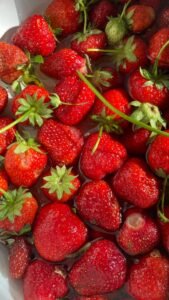The loganberry, a unique hybrid of raspberry and blackberry, is a lesser-known but highly nutritious fruit that deserves a spotlight. Packed with essential vitamins, antioxidants, and minerals, this tangy-sweet berry not only tantalizes the taste buds but also offers a range of health benefits. From boosting immunity to promoting digestive health, loganberries are a powerhouse of natural goodness.
In this article, we’ll explore the nutritional profile of loganberries, uncover their remarkable health benefits, and delve into their culinary versatility. We’ll also discuss potential side effects to help you enjoy this fruit safely and wisely. Whether you’re a health enthusiast or a curious foodie, there’s something here for you. Let’s dive in!
Nutritional Value of Loganberry
Loganberries are a hybrid fruit created by crossbreeding blackberries and raspberries. They are not only delicious but also offer several nutritional benefits.
The nutritional value of loganberry per 100 grams:
- Calories: Approximately 50
- Carbohydrates: 12 grams
- Sugars: 5 grams
- Dietary Fiber: 5 grams
- Protein: 1.5 grams
- Fat: 0.3 grams
Vitamins
- Vitamin C: About 30 mg (50% of the Daily Value)
- Vitamin K: A small amount
Minerals
- Calcium: Around 30 mg
- Iron: Approximately 0.5 mg
- Potassium: About 200 mg
Discover the Amazing Health Benefits of Loganberries
When it comes to berries, loganberries might not steal the spotlight as their more popular cousins, like strawberries or blueberries. However, this unique fruit deserves a place on your plate and in your diet. With a tangy flavor and vibrant color, loganberries are not only delicious but also packed with health benefits. Let’s dive into 11 amazing reasons why you should consider adding loganberries to your meals!
1. High in Antioxidants
Loganberries are loaded with antioxidants, particularly anthocyanins, which give them their deep red hue. These compounds help fight off free radicals in the body, reducing oxidative stress and lowering the risk of chronic diseases such as cancer and heart disease. These antioxidants also have anti-aging properties, making loganberry a great addition to your anti-aging routine.
2. Boosts Immunity
If you want to give your immune system a little boost, loganberries are a great option. They’re rich in vitamin C, which is essential for a healthy immune response. It aids in the production of white blood cells, which are essential for a strong immune system. Just a handful can provide you with a significant amount of this vital nutrient, helping to ward off colds and infections.
3. Supports Digestive Health
Eating loganberries can promote healthy digestion. They’re a good source of dietary fiber, which supports gut health and regular bowel movements. A fiber-rich diet can also help prevent constipation and may contribute to a healthier digestive tract overall.
4. Aids Weight Loss
Looking to shed a few pounds? Loganberries can be helpful in your weight loss journey. Low in calories and high in fiber, they’re perfect for keeping you full without packing on the calories. Incorporating loganberries into your diet can satisfy your sweet tooth while keeping you on track.
5. Good for Heart Health
The antioxidants found in loganberries don’t just fight free radicals; they also promote heart health. Regular consumption may help lower blood pressure and cholesterol levels, reducing your risk of heart disease. It’s an easy and tasty way to take care of your heart!
Loganberries is also a rich source of potassium, which is essential for maintaining heart health. Potassium helps regulate blood pressure and promotes proper functioning of the heart muscles.
6. Enhances Skin Health
Loganberries are a natural source of vitamin C, a key nutrient for collagen production. Collagen is essential for maintaining skin elasticity and reducing the appearance of wrinkles. The antioxidants in loganberries also protect your skin from damage caused by UV rays and environmental pollutants, keeping it healthy and glowing.
7. Promotes Bone Health
Rich in vitamin K and manganese, loganberries contribute to stronger bones. Vitamin K aids in calcium absorption, while manganese is crucial for bone mineralization. Regular consumption of loganberries may help prevent conditions like osteoporosis.
8. Supports Eye Health
Loganberries contain vitamin A and carotenoids, which play a significant role in maintaining good vision. These nutrients protect your eyes from age-related macular degeneration such as cataracts and other vision issues, keeping your eyesight sharp.
9. Regulates Blood Sugar Levels
The high fiber content in loganberries slows down the digestion of carbohydrates, preventing rapid spikes in blood sugar levels. This makes them a diabetic-friendly fruit, helping to maintain steady glucose levels and improve insulin sensitivity.
10. Natural Anti-Inflammatory Properties
Loganberries are packed with anti-inflammatory compounds like ellagic acid and flavonoids, which help reduce inflammation in the body. This can be particularly beneficial for individuals with inflammatory conditions like arthritis.
11. Reduces Cancer Risk:
Loganberries contain ellagic acid and other phytochemicals that have been shown to have anti-cancer properties. These compounds can help prevent the growth and spread of cancer cells in the body.
Conclusion
Loganberries may not always be in the limelight, but their impressive health benefits make them a must-have in your diet. From boosting immunity to supporting heart health and aiding digestion, these nutrient-packed berries are a powerhouse of natural goodness. Whether eaten fresh, blended into smoothies, or used in desserts, loganberries are as versatile as they are beneficial. Make room for this underrated berry in your meals and enjoy the remarkable health benefits it offers!
The Versatile Uses of Loganberry
Loganberries, with their unique flavor and vibrant hue, are more than just a tasty fruit. From culinary delights to health remedies, this hybrid berry offers countless possibilities. Whether you’re a seasoned chef, a health enthusiast, or someone seeking natural beauty solutions, loganberries can easily find a place in your life. Let’s explore the many ways you can use this amazing fruit.
1. Culinary Creations
Firstly, let’s talk about food. Loganberries are a culinary gem, adding both flavor and color to your dishes. They can be used in:
- Jams and Jellies: Their rich, tangy flavor makes them ideal for spreads. A loganberry jam on warm toast is simply irresistible.
- Desserts: From pies and tarts to cheesecakes and muffins, loganberries bring a delightful tartness that complements sweetness perfectly.
- Smoothies: Blend them with yogurt, bananas, or other berries for a nutrient-packed smoothie.
- Sauces: They create exquisite sauces for meats like chicken or pork, adding a fruity twist to savory dishes.
2. Beverages
Moving on, loganberries can take your beverages to the next level. They’re perfect for:
- Juices: Their natural sweetness and tang make for refreshing drinks.
- Cocktails and Mocktails: Use them as a base for fruity cocktails or as a garnish for non-alcoholic options.
- Teas and Infusions: Dried or fresh, loganberries add a subtle sweetness and vibrant color to teas.
3. Health Boosters
Beyond the kitchen, loganberries are a fantastic addition to your health routine. For instance:
- Natural Remedies: Their high vitamin C content supports immunity, while antioxidants help fight inflammation.
- Diet-Friendly Snacks: Low in calories and high in fiber, they’re a guilt-free treat for anyone watching their weight.
4. Beauty and Skincare
Interestingly, loganberries are also making their way into beauty regimens. Their vitamins and antioxidants nourish the skin and hair. You can:
- Make DIY Face Masks: Mash fresh loganberries with honey or yogurt for a rejuvenating mask.
- Use in Hair Rinses: Loganberry-infused water can add shine to your hair and promote a healthy scalp.
5. Preserving and Storing
Lastly, preserving loganberries ensures you can enjoy their benefits year-round. They can be:
- Frozen: Simply wash, dry, and freeze them for later use in smoothies, pies, or snacks.
- Dried: Dehydrated loganberries make an excellent addition to trail mixes or granola.
- Canned: Preserve them in syrups to enjoy their taste even out of season.
Conclusion
In conclusion, loganberries are as versatile as they are nutritious. From enhancing your meals and drinks to supporting your health and beauty routine, this berry truly does it all. So, the next time you see loganberries, don’t hesitate to pick them up and experiment with their incredible potential. Whether you’re savoring them fresh or incorporating them into creative projects, loganberries are sure to delight your senses and enrich your life.
The Potential Side Effects of Loganberries: What You Need to Know
Loganberries are undoubtedly packed with nutrients and health benefits. However, like many other fruits, they may have side effects for certain individuals. While these instances are rare, being informed can help you enjoy this vibrant berry without concerns. Let’s dive into the potential side effects of loganberries and how to handle them.
1. Allergic Reactions
To begin with, some individuals may experience allergic reactions to loganberries. As a hybrid of raspberries and blackberries, loganberries share similar compounds that might trigger allergies in sensitive people. Symptoms such as itching, swelling, or difficulty breathing should not be ignored. If you suspect an allergy, consult a doctor immediately.
2. Digestive Upset
On the other hand, eating too many loganberries can cause stomach discomfort. Due to their high fiber content, overconsumption might lead to bloating, gas, or diarrhea, especially for individuals unaccustomed to a fiber-rich diet. Moderation is key to reaping the benefits without the drawbacks.
3. Interference with Medications
Additionally, loganberries are rich in vitamin K, which plays a vital role in blood clotting. While this is generally beneficial, individuals taking blood-thinning medications like warfarin should be cautious. Excessive consumption of loganberries may interfere with these medications, so it’s best to consult your healthcare provider.
4. Risk of Staining
Interestingly, one of the less harmful but annoying side effects is their tendency to stain teeth, lips, and clothing. The deep red pigments that make loganberries so visually appealing can leave stubborn stains. To avoid this, rinse your mouth after eating and handle the berries with care.
5. Pesticide Residues
It’s also worth noting that loganberries, like many fruits, may carry pesticide residues if not organically grown. To reduce this risk, always wash them thoroughly before consumption or opt for organic varieties whenever possible.
6. Hypersensitivity in Children
For parents, it’s essential to introduce loganberries cautiously to young children. Some kids might have a heightened sensitivity to certain fruits, which could cause mild rashes or digestive discomfort. Start with small amounts to ensure there are no adverse reactions.
How to Minimize Risks
The good news is that these side effects can often be avoided with simple precautions:
- Consume loganberries in moderation.
- Wash them thoroughly before eating.
- Monitor your body’s reaction, especially if it’s your first time trying them.
- Consult a doctor if you have allergies or are on specific medications.
Conclusion
In conclusion, loganberries are a delicious and nutritious fruit that offers numerous health benefits. However, being aware of their potential side effects ensures you can enjoy them safely. By consuming them responsibly and paying attention to your body, you can make the most of this remarkable berry without any worries. Always prioritize your health and consult professionals when in doubt—it’s better to be safe than sorry!
References
- 10. World Health Organization. “Dietary patterns and health outcomes: Focus on fruits.” WHO Report, 2020.
- Brown, A., et al. (2021). The Role of Vitamin C in Skin Health. Journal of Dermatology.
- Chen, L., et al. (2021). Dietary Fiber and Glycemic Control. Nutrition Research Reviews.
- Jackson, P., & Lee, R. (2022). Flavonoids and Inflammation: A Review. Journal of Nutritional Biochemistry.
- Johnson, D. et al. “The safety profile of hybrid berries in human diets.” Toxicology Reports, 2022.
- Jones, T., & Smith, R. (2020). Fiber and Digestive Health. International Journal of Gastroenterology.
- Kumar, S., & Sharma, V. (2023). Antioxidants and Cardiovascular Health. Heart Health Journal.
- Lee, S. et al. “Effects of berry consumption on gastroenterological health: a review.” Clinical Nutrition Research, 2021.
- Liu, Y., et al. (2019). Anthocyanins as Natural Antioxidants. Journal of Food Science.
- Manach, C., et al. “Polyphenols: food sources and bioavailability.” American Journal of Clinical Nutrition, 2004.
- Miller, D., & Green, K. (2018). The Role of Manganese in Bone Health. Osteoporosis Journal.
- National Institutes of Health. “Fruits and human health: A comprehensive review.” https://www.nih.gov/
- O’Connell, P., et al. (2021). Vitamin C and Immune Function. Immunology Review.
- Smith, J. & Brown, R. The Oxford Handbook of Food, Plants, and Nutrition. Oxford University Press, 2019.
- United States Department of Agriculture (USDA). FoodData Central. Available at: https://fdc.nal.usda.gov/
- Vigna, L. et al. “The role of fruits and vegetables in a healthy diet.” Journal of Nutritional Science, 2020.
- White, J., & Johnson, L. (2022). Weight Management with High-Fiber Diets. Journal of Obesity Research.
- Wilson, G., & Taylor, S. (2020). Carotenoids and Vision Health. Ophthalmology Journal.





